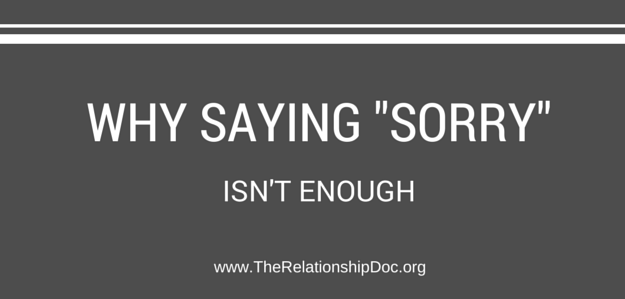 Imagine yourself at Starbucks, and someone passing by knocks over your double latte. The offender then flippantly responds with “Sorry, didn’t mean to do it”—and keeps on walking out of the store.
Imagine yourself at Starbucks, and someone passing by knocks over your double latte. The offender then flippantly responds with “Sorry, didn’t mean to do it”—and keeps on walking out of the store.
While the above scene is certainly infuriating for the person with coffee in their lap, a slight from a stranger will likely pass within the day. However, getting that type of indifferent reaction from someone we know and care about, specifically our significant other, usually affects us a lot longer and hurts us much more.
Whether that hurt is caused accidentally or intentionally, it can be damaging to an intimate relationship if not properly repaired. After lashing out in anger, a “that’s not what I meant,” or even a quick “I’m sorry I didn’t mean to” statement given later by the offending partner, is not an adequate fix because the key issue is not about the intentionality of the offender. Similar to the Starbucks example above, where the offender never meant to douse you with your overpriced beverage, the damage has nothing to do with the person’s intentions. It is how the hurtful words or action impacted you that truly matters. The impact is what needs to be addressed.
As specifically pointed out in the Everyday Feminism article “Intent versus Impact: Why your Intentions Don’t Really Matter,” when you’ve hurt someone, it doesn’t matter whether you intended to do so or not. It’s how you rectify the situation that counts.
The healthiest couples don’t simply focus on intent (which may be sufficient if the offense is only of a mild or moderate degree); they address the impact of their words and actions. Missing an occasional appointment or engagement because “I thought it was on Friday, not Thursday” happens to the best of us. However, serious disregard for a partner’s expectations (such as forgetting your anniversary or “date night”) cannot be as easily overlooked. The damage must be repaired to keep the relationship connection strong.
When repairing the connection, it’s the way you make amends that truly matters if you’ve seriously offended or emotionally wounded your partner. You must address the hurt, and how it affects him or her. Even if you’re let off the hook, if you don’t take time to discuss the issue, you’re missing not only the opportunity to understand how your partner really feels, but the opportunity to connect on a deeper level as well.
A sincere and thorough apology needs to include much more than “I’m sorry.” Someone seeking to make amends must understand the damage done, and how to prevent it from happening again.
The following is a list of steps necessary to repair relationship damage:
1. Sincerely apologize.
2. Bear witness to the other person’s pain or hurt. Ask for specifics, such as “Tell me how it affected you when I didn’t remember our important day.”
3. Engage in reflective listening to make sure your partner knows you got it: “You felt (frustrated/sad/angry/disappointed) when I didn’t show up.”
4. Address the future in terms of how you’ll ensure you won’t repeat or cause the same damage again: “I’ll put all future appointments on two online calendars. “
Remember, the whole issue isn’t about who you are as a person. “I’m not racist, sexist, or a bad person” statements miss the point. The steps mentioned above are about addressing how your actions or words affected someone else, which is an essential step to achieve, if you want to maintain a deep connection in relationships.
So whether you accidentally knocked over someone’s drink at Starbucks, missed your wedding anniversary, or lost your temper and said words you now regret, it’s how you repair the damage that matters in the end. By extending a heartfelt apology, trying to understand how the other person was impacted, and doing our best to act more accountably in the future, we can improve relationships of every kind.